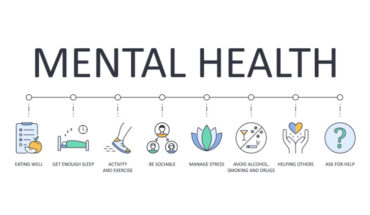The journey of motherhood is often fraught with challenges, and for those struggling with additional mental health issues, these challenges can be magnified. The societal expectations placed on mothers to be selfless, nurturing, and always available, can create a toxic environment that discourages women from seeking the help they need. Here Lee Hawker, Clinical Director of The Cabin Chiang Mai, looks at the challenges and obstacles faced by mothers in need of mental health care and meaningful support.
The stigma surrounding mothers’ mental health
One of the most significant barriers for mothers seeking treatment is the persistent stigma surrounding mental health. The fear of judgment, shame, and potential loss of custody can deter women from seeking help, even when they are in desperate need. This stigma is particularly insidious, as it can lead to feelings of isolation, guilt, and self-blame, further exacerbating their struggles.
Mothers are often expected to shoulder the burden of their family’s well-being, and when they struggle with addiction or mental health issues, they can face harsh scrutiny from their communities. The judgment that they are somehow failing as mothers if they seek help is both unfair and damaging. It perpetuates the myth that women must be flawless caregivers, leaving little room for their own needs. This societal pressure often forces mothers into silence, hiding their struggles and delaying critical treatment.
A mother’s responsibilities
Mothers often feel a deep sense of responsibility to their children, and the fear of neglecting their parental duties can prevent them from prioritizing their own mental health. The logistical challenges of finding childcare, arranging appointments, and managing household responsibilities can make it difficult for mothers to seek help Additionally, the financial strain of childcare can be a significant barrier for those seeking professional help.
This sense of duty, while admirable, can become overwhelming when combined with untreated mental health issues or addiction. Mothers may convince themselves that they must endure their struggles alone to avoid disrupting their children’s lives. However, this mindset can be detrimental, as untreated conditions can worse over time, leading to more significant problems down the line.
The impact of unresolved issues
Delaying treatment for addiction or mental health issues can have serious consequences for both mothers and their children. Untreated conditions can lead to a range of problems, including relationship difficulties, financial instability, and even legal issues. Moreover, the negative impact on a mother’s mental health can have a ripple effect on the entire family, affecting children’s emotional well-being and development.
“Children who grow up in environments where their mother’s mental health needs are not met may struggle with their own mental and emotional challenges. They may internalize their mother’s distress, leading to problematic attachment styles, anxiety, behavioural issues, and difficulties in school. Over time, the stress of untreated mental health issues can strain familial relationships, creating a cycle of dysfunction that is difficult to break” says Lee.
A particularly insidious consequence of untreated mental health issues is the perpetuation of generational trauma. Many mothers do not receive the support and treatment they need, the emotional and psychological wounds they carry can be passed down to their children. This generational trauma manifests in patterns of behaviour, emotional responses, and coping mechanisms that children may unconsciously adopt, often leading to similar struggles in their own lives.
Generational trauma can deeply affect a child’s sense of self-worth, their ability to form healthy relationships, and their overall mental health. It can create a legacy of pain that continues from one generation to the next, making it even more challenging to break the cycle of dysfunction. By addressing mental health issues and seeking treatment, mothers have the opportunity to heal not only themselves but also to disrupt the transmission of trauma to their children, fostering a healthier future for their families.
The importance of self-care
It is essential for mothers to prioritize their own mental health and well-being. Just as we would encourage our children to take care of themselves, we must also extend that same compassion to ourselves. Self-care is often misunderstood as selfishness, especially for mothers who are conditioned to put their family’s needs above their own. However, self-care is a critical component of good parenting. A mother who is mentally and emotionally healthy is better equipped to provide the love, support, and guidance her children need. By prioritizing her own well-being, she is also modelling healthy behaviours for her children, teaching them the importance of taking care of themselves.
Breaking down the barriers
To encourage mothers to seek help, society needs to continue to challenge the stigma surrounding mental health and addiction. Open conversations about these issues can help to reduce shame and create a more supportive environment.
Support systems, including family, friends, and community organisations often play a crucial role in empowering mothers to seek the help they need. In cases where domestic abuse is a factor, specialised services that address both mental health and safety concerns are essential. Safe spaces where women can access treatment without fear of retribution are vital in breaking the cycle of abuse and dependency.
It is also important to emphasise the benefits of seeking treatment. By addressing underlying issues, mothers can improve their overall well-being, strengthen their relationships, and become better parents. Investing in mental health and addiction treatment is an investment in the future of families.
Why mothers must put their mental health first
Not only does it improve their own quality of life, but it also has profound positive effects on their children and families. When a mother is mentally healthy, she can provide a stable and nurturing environment for her children, model healthy behaviours, and break the cycle of dysfunction that can arise from untreated mental health issues. However, the reasons why women might delay treatment are equally complex. Stigma, parenting responsibilities, financial barriers, and the toxic dynamics of abusive relationships all play a role. The fear of judgment, the overwhelming pressure to be a perfect mother, and the very real threat of losing their children can make the decision to seek help seem impossible.
In a society that often glorifies the self-sacrificing mother, it is essential that we shift the narrative to one that values the mental health and well-being of all mothers. By doing so, it would become possible to create a culture that supports women in seeking the help they need, rather than perpetuating fear of stigma or retribution.
- Broken-heart syndrome patients increased risk - 25th March 2025
- Effective digital healthcare depends on trust - 24th March 2025
- Natural fats in human skin link to eczema - 24th March 2025






